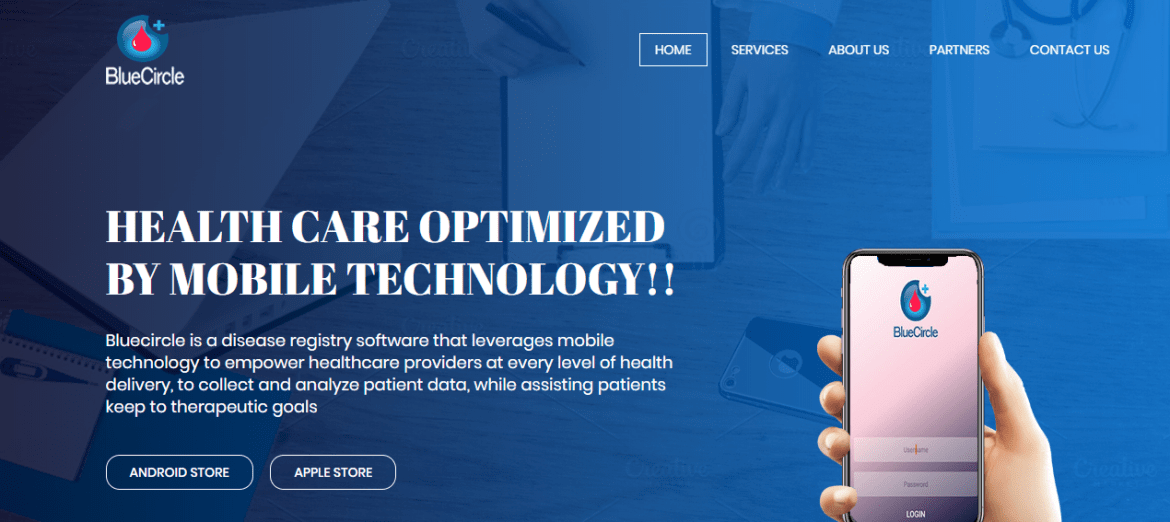In 2018 while working on a friend’s school project, Joel Aniegbe, a final year medicine and surgery student at the University of Nigeria, Nsukka (UNN) had an idea to build a simple mobile application to assist doctors caring for diabetic patients.
The application, Notitia, was to serve doctors at the University of Nigeria Teaching Hospital (UNTH), nearby. He enlisted the help of his friend, Edoga Obinna, a software developer who is a graduate of electronic engineering from UNN, to develop the mobile application.
Not keen on making a business out of the project, Notitia was deployed free to the hospital. But having used it for a while and seeing value, UNTH offered to pay for Notitia if more features could be added to the application.

Another breakthrough would come as UNTH offered the startup an opportunity to present the product at a conference held by the Endocrine and Metabolism Society of Nigeria (EMSON).
“It was at this time we realised that doctors had a strong desire for a solution which was easy to use in capturing data electronically on their patients as accessing health data from paper records was very tedious and discouraging,” Aniegbe tells Techpoint.
This experience led the pair to branch out from its initial proposition of catering to hospitals with diabetic patients to build a more holistic solution to assist healthcare facilities with better access to health data.
“We wanted to solve the problem of continuity of care for diabetes patients, but found an even deeper problem of a very huge data paucity limiting the functionality of healthcare professionals to improving the care for patients in general.”
It makes sense why Notitia chose to pivot.
The insights derived from healthcare data drives healthcare activities around the world, especially in developed countries.
In this part of the world, however, it’s no secret that there are a lot of challenges that limit the utilisation of healthcare data from poor record-keeping and improper documentation to an inadequate power supply and alarming doctor-to-patient ratios.
Improving access to healthcare data
From the moment the startup pivoted, the name of its product changed to BlueCircle while Notitia remained the name of the company.
Notitia, as a company, is making access to clinical electronic registries easy for healthcare facilities in Nigeria. A clinical registry provides doctors with a database and tools to manage a specific patient population living with chronic diseases.
BlueCircle, on the other hand, is the electronic registry Notitia is using to carry out this objective.
The platform allows health facilities to manage their patients’ diabetes, asthma, and cancer patients by providing a feature which lets them upload and deliver necessary information to their patients, mostly through USSD.
Aniegbe believes BlueCircle presents a strong approach to solve the problem of electronic data scarcity in Nigerian hospitals and says the company has simplified the process of setting up the software to accommodate non-tech savvy healthcare professionals.
“We hope to evolve BlueCircle to be used as a clinical registry for both infectious and non-infectious diseases and to adapt it perfectly to the poor Internet connectivity in emerging markets, such that it can be deployed even at rural areas in primary health centres across the country,” he says.

Despite being in operations for just two years, Aniegbe says BlueCircle’s content management system gives it an edge when compared to similar providers in the market.
“There are a couple of companies building powerful eHealth record capture platforms for various purposes, for example, eHealth Africa. However, ours can accommodate the huge dynamicity in the medical speciality. Also, our proprietary patient behaviour modification algorithm is the first of its kind.”
BlueCircle targets low to medium budget healthcare facilities storing patient data with chronic diseases on paper. When it expands, Aniegbe says the startup will begin to target pharmaceutical companies and research organisations.
As a software-as-a-service startup (SaaS), BlueCircle charges an annual subscription to healthcare entities in the form of ₦1,000 per year for each patient uploaded on its platform.
Investment and scaling
So far, it has been bootstrapping on the combined funds from revenue secured during its MVP pilot and startup competition grants totalling almost $10,000. In addition, Aniegbe says the startup is looking to raise an angel investment soon.
“Our angel investment of $50,000 was delayed in January because of a due diligence hitch. Unfortunately, COVID-19 disrupted the process as we entered the final stages during the 3rd week of March. Although delayed, we have no worries on the fruition of the investment,” Aniegbe says regarding the status of the investment.

Having built five eRegistries — for diabetes, asthma, cancer, chronic kidney disease, and paediatrics renal, it has only deployed diabetes and cancer eRegistries.
This was done for a client with a combined enrollment of nearly 400 patients and has brought BlueCircle ₦450,000 worth of subscription license sales.
Aniegbe says to achieve these numbers in two years, BlueCircle has had to secure both national and international partnerships. They include Pandemic Tech, an organisation focused on eHealth for pandemic illnesses; the Nigerian Association of Nephrologists; Tech Ranch, a US-based virtual accelerator; and the University of Nigeria Center for Clinical Trials.
For an undergraduate, Aniegbe has big plans. Upon graduation, he will set his sights on BlueCircle attaining a large market share in the healthcare registry space by 2025.
“We want 80% of all health registers across primary, secondary, tertiary, and even private hospitals in Nigeria, to be replaced with the appropriate BlueCircle smart offline register by 2025,” he said.
But before that happens, the two-year-old startup should be ready to get its hands dirty in a market that seldomly changes from its rigid adoption of technology.
Comments
Source of Article

